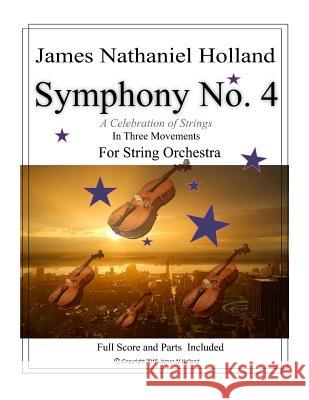Symphony No. 4: "A Celebration of Strings" In Three Movements For String Orchestra » książka
Symphony No. 4: "A Celebration of Strings" In Three Movements For String Orchestra
ISBN-13: 9781539611653 / Angielski / Miękka / 2016 / 176 str.
Symphony No. 4, A Celebration of Strings For String Orchestra and Soloists (Violin 1, Violin 2, Viola (3), Cello) In Three Movements (Complete Duration: 34:40) (Durations: Movement 1 18:57, Movement 2 4:47, Movement 3 11:59) Video Presentation with images of the United States: https: //www.youtube.com/watch?v=vDWulFsp1W4 21st Century symphony yet to be premiered. Perfect for one of those outdoor summer concerts or 4th of July concert. Contemporary classical music which is accessible music for the general public. The Fourth Symphony of American Costa Rican composer, James Nathaniel Holland is dedicated to the String section of the orchestra, allowing the instrument to showcase their strengths such as, lush harmonic chords, scurrying 16th note passages, sentiment, rhythm, and melodic singing. Holland does not limit the symphony to only a string orchestra as a group, but interweaves the tonal color and timbre of solo violin, viola and cello. We begin the first movement with a majestic opening that travels to a sentimental Mendelssohn like 3/4 melody. Next, the melancholy chromatic progression against a C chord evokes a solo violin singing the mantra, Namo Bhagavate Vasudevaye, sometime accompanied by solo cello. Trouble musically lurks as the strings suddenly march in 6/8 tempo. The solo instrument invoke the mantra again. We next fall into a minor key waltz with the viola chatting an opinion every once in a while. We travel into strange, musical landscape and return to our mystic progression for the finale of Movement 1. Movement two is lively, rhythmic and happy. It is based on Handalian/choral, imitation technique with each section scurrying up and down the range. Again, the solo instruments add a different tonal color with its mid-east sounding ostinato. The string section returns with a variation on the imitative theme to end the movement. The third movement continues with disguised variations of the first movement, a more sober majesty with the same lush, complex chords. A motive begins a creascendo which builds and builds until it explodes into a tremelo by the cellos and double basses. Next a solo viola begins to close the symphony with harmonics shifting into strange progressions almost every measure. The orchestra exchanges the melody with the solo instruments frequently as we continue into a hushed repetition of the first movement's opening three themes. The symphony closes on the chromatic progression against the C chord. Finally the solo violin is heard with its mantra motif in the distance as the symphony ends reverent and hushed. For some reason, this musically complex symphony lends itself perfectly to the complex history, people and icons of the United States of America, the composers native country. Each has its moments of pride, moments of shame, violence, redemption, enthusiasm, optimism, creative energy and reinvention.
Zawartość książki może nie spełniać oczekiwań – reklamacje nie obejmują treści, która mogła nie być redakcyjnie ani merytorycznie opracowana.











